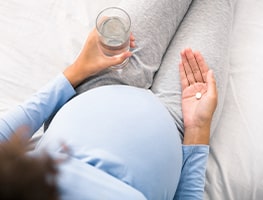Conception information
Today we know a lot more about the importance of pre-conception care, and are aware that careful planning can have a positive impact on the health of the couple and their baby, both while in the womb and throughout life.
Pre-conception care is not solely an issue for the ladies. Did you know, for example, that it takes up to three months for sperm to mature so that they are capable of fertilising an egg? Pre-conception care for men can improve the viability and functionality of their sperm, as well as provide a general sense of well-being, so we advise both partners to be prepared.
When to start your pre-pregnancy dietary changes?
It is never too early to start pre-conception care. To get your body ready for pregnancy may take you a few months or even longer, the important part is that you focus on the things you can do before and between pregnancies (if this is your second pregnancy) to increase the chances of having a healthy baby.
For most women, pre-pregnancy changes are only made once they start trying (or go off the pill). Start at least one month before going off the pill or “trying” so that you can build up adequate stores of folic acid and other vital nutrients.
There are many theories and recommendations to help you get pregnant, but common to most of the research are three basic aims:
To achieve and maintain a healthy body weight.
To ensure a healthy diet with adequate levels of vitamin B9 (folic acid).
To ensure a varied diet that offers adequate levels of other beneficial nutrients.
To make these points even clearer, we have come up with 16 points on how to get pregnant. For some, these will be a challenge, so start small and keep progressing.
The sixteen essential points on how to get pregnant:
1. Get the timing right
Remember that the day before ovulation is the most important day for intercourse to ensure the freshness of both sperm and egg. If you are unsure of when you ovulate, use an ovulation kit or read up about understanding your cycle.
2. Avoid cigarette smoke
It seems highly likely that smoking lowers a man’s sperm count; it may lead to sperm abnormalities (sperm count and motility) and may be a factor in impotence. Even more notably, smoking has severe effects on female fertility, such as ovulation, and well-documented effects on embryonic development in pregnant women, for example, low birth-weight infants. Smoking also lowers the body’s total vitamin C. Vitamin C can potentially reduce some of the side-effects from smoking, such as poor eyesight and ‘ageing’ of our cells.
3. Avoid alcohol where possible
Most healthcare agencies across the globe recommend that you avoid drinking entirely when planning for pregnancy, so that if you were to become pregnant without knowing, alcohol won’t affect the baby. Men who drink reduce their sperm quality, making it harder to conceive.
4. Avoid over-exposure to caffeine (less than one cup per day)
It is recommended that women who are pregnant or trying to get pregnant get no more than 200 milligrams (mg) of caffeine per day. This is the amount of caffeine in about one cup of coffee.
5. Avoid exposure to chemicals (including those used in the home)
Try to limit your exposure to toxins such as cigarette smoke, alcohol, artificial sweeteners and recreational drugs. Chemicals such as solvents, pesticides and many household products should also be avoided.
The risk of pesticides is dose-related: the greater your exposure, the greater the likelihood that you will have a reaction. The effect on our health of pesticide residue in our food is not yet clearly documented. Obviously, a way to avoid pesticides is to buy organic produce and meats. This is not always a financial feasibility though.
‘Organic-certified produce’ requires that the food was grown, harvested, stored and transported without the use of synthetic chemicals, irradiation or fumigants. Many supermarket chains now retail their own organic brands.
Fresh produce from farmers’ markets is also a good option and, of course, always rinse your fresh fruit and vegetables off properly before cooking or eating them.
6. Check medication side-effects with your doctor
If you are on medications, review them with you medical practitioner. Check your medicine cabinet at home for drugs that may affect fertility and pregnancy. For men this may include Tagamet for heartburn and Azulfidine for rheumatoid arthritis. Women may need to review antibiotics and painkillers and – under the guidance of a pharmacist or healthcare professional – swap to a more appropriate medication.
7. Maintain a healthy body weight
The importance of a healthy body weight for women who want to get pregnant has been well documented. The sex hormones produced by men and women are closely linked to weight. It appears that an extra 10% to 14% of body fat can reduce a woman’s chances of conception.
Obesity in women is a high-risk issue in conception and pregnancy; for example, overweight women are more likely to have miscarriages. Likewise, underweight women have a higher risk of premature labour and anaemia.
8. Men should avoid hot baths and saunas
Testicles are generally 2 °C cooler than the rest of the male body. Sperm functions best at 34-35 °C. So guys, it’s best to avoid spas and saunas and opt for boxer shorts, which is a sexier look. The popular myth about tight jeans and male fertility is just as we said – a myth.
9. Reduce stress and where possible practise relaxation techniques
Relaxation can play an integral role when wanting to get pregnant, with evidence that those with reduced stress or improved ability to handle stress may have better rates of conception. Further, this has a positive effect on the foetus. Even mild stress can interfere with a man’s testosterone production and can lower sperm count.
This evidence may shed some light on why many couples with fertility issues found that after in vitro fertilisation (IVF) or adopting, they fell pregnant without assistance. Given the elusive nature of stress, it remains a difficult subject to substantiate; however, there’s no doubt that lifestyle changes that enhance positive feelings are of benefit.
10. Exercise regularly to promote tissue strength and blood circulation
Moderate regular exercise is important in any healthy lifestyle. Going for a brisk walk, exercising at the gym or playing sport all contribute to general health and well-being and ultimately improve the chances of getting pregnant by lowering the risks of diseases thought to be caused by inactivity and overweight.
However, over-exercising is not advisable for women, as this can adversely affect hormone balance and impair ovulation (due to the lack of body fat). Further, in the event of conception, excessive exercise can impair placental and foetal growth, as well as potentially overheat the foetus. Exercise considered ‘excessive’ would be running the equivalent of 16 kilometres a week.
11. Eat a nutritious diet
Studies have shown that a nutritious diet with adequate protein and complex carbohydrates, nutrient-dense foods, foods with healthy fats over unhealthy fats, and one that is high in fresh fruit and vegetables, provides a solid nutritional basis for health and conception.
A good pre-conception care diet is one that is high in vitamin C, zinc and folic acid (particularly for women); for example, red capsicum, coloured berries and guava are all very rich in vitamin C; nuts and seeds are high in zinc; and grains are good sources of folic acid (although supplementation is commonly recommended for B9).
Restrictive diets have been shown to have a negative effect on women’s hormonal levels (such as progesterone) and consequently affect couples trying to get pregnant – so avoid heavy dieting.
Both men and women should avoid over-indulging in sugar, especially added sugars, as this can interfere with hormone levels via our insulin balance.
12. Drink plenty of good quality water (8-10 glasses a day)
Every cell in our body contains water. Water is the fluid in which all life-processes occur in the body. The bodily functions our body fluids perform include: transporting nutrients and waste throughout the body; forming much of the structure of large molecules; and providing suspension by acting as a shock-absorber inside the eyes, spinal cord and the amniotic sac surrounding the foetus in the womb. Furthermore, many chemical reactions occur in fluid; water acts as the solvent for minerals, vitamins, amino acids, glucose and a huge range of other small molecules; it is also important in lubricating and cushioning joints, assisting in the regulation of body temperature and maintaining blood volume.
Drink good quality water throughout the day. If your urine is coloured, has a strong odour and you urinate infrequently, you are likely to be dehydrated. Fluid intake is particularly important in hotter weather, when exercising, and during pregnancy.
13. Begin taking 400 mcg/d of folic acid
Studies have shown that taking supplements of dietary folic acid before pregnancy and during the first trimester significantly lowers the risk of neural tube defects. Talk to your pharmacist or healthcare professional about the right supplement for you.
14. Discuss nutritional supplementation with a healthcare professional
This is particularly important if you are considered to be in a high-risk category. Women in a high-risk category, such as those with an illness, history of miscarriage, anxiety, etc., should consider supplementation under the guidance of a qualified healthcare professional; this may also be wise for many men.
As mentioned, it’s important to start taking B9, and also consider a multivitamin and mineral supplement that contains zinc, iron, vitamin C, B group vitamins and vitamin E. Remember, though, that supplements are not a substitute for a good diet, but rather a safeguard. Also, research indicates that the benefits of these nutrients is greatest in our foods, rather than when taken as a supplement.
Note: Women wanting to fall pregnant should not take excessive amounts of vitamins A and D because they can potentially be toxic.
15. Review pets in the home
Especially cats, regarding toxoplasmosis and potential effects on the unborn child. Read more on what to avoid during your pregnancy here.
16. Have a check-up with your GP and dentist
Other pre-conception care considerations include testing for rubella immunity, diabetes, blood pressure and a full blood count (ensuring iron status is adequate). Having a dental check-up is also recommended, so that any treatment can be done before pregnancy.
For more information see Getting Pregnant


















